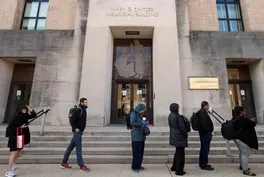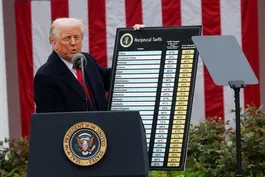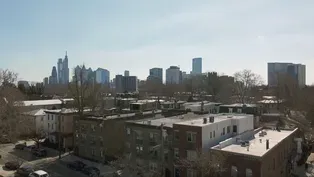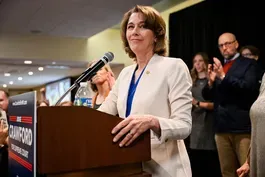
Supreme Court hears Planned Parenthood Medicaid funding case
Clip: 4/2/2025 | 5m 39sVideo has Closed Captions
Supreme Court case could decide if states can block Medicaid funding to Planned Parenthood
The U.S. Supreme Court heard arguments in a case that could dramatically change how Medicaid recipients can choose their own medical providers. The case went before the court after South Carolina attempted to remove Planned Parenthood clinics from the state’s Medicaid program since it also provides abortions. Geoff Bennett discussed more with special correspondent Sarah Varney.
Problems with Closed Captions? Closed Captioning Feedback
Problems with Closed Captions? Closed Captioning Feedback
Major corporate funding for the PBS News Hour is provided by BDO, BNSF, Consumer Cellular, American Cruise Lines, and Raymond James. Funding for the PBS NewsHour Weekend is provided by...

Supreme Court hears Planned Parenthood Medicaid funding case
Clip: 4/2/2025 | 5m 39sVideo has Closed Captions
The U.S. Supreme Court heard arguments in a case that could dramatically change how Medicaid recipients can choose their own medical providers. The case went before the court after South Carolina attempted to remove Planned Parenthood clinics from the state’s Medicaid program since it also provides abortions. Geoff Bennett discussed more with special correspondent Sarah Varney.
Problems with Closed Captions? Closed Captioning Feedback
How to Watch PBS News Hour
PBS News Hour is available to stream on pbs.org and the free PBS App, available on iPhone, Apple TV, Android TV, Android smartphones, Amazon Fire TV, Amazon Fire Tablet, Roku, Samsung Smart TV, and Vizio.
Providing Support for PBS.org
Learn Moreabout PBS online sponsorshipGEOFF BENNETT: The U.S. Supreme Court heard arguments today in a case that could dramatically change how Medicaid recipients can choose their own medical providers.
The case went before the court after South Carolina attempted to remove Planned Parenthood clinics from the state's Medicaid program since it also provides abortions.
Special correspondent Sarah Varney joins us now.
Sarah, it's good to see you.
So, the technical legal issue before the justices deals with whether people who use Medicaid, the low-income assistance program, can choose their providers.
But tell us about this case, which tests whether South Carolina is legally allowed to cut off Medicaid funding for Planned Parenthood.
SARAH VARNEY: So, this case actually goes back to 2018, when the Republican governor then signed an executive order terminating Planned Parenthood's participation in the state's Medicaid program because it separately funded abortions.
The clinics challenged this executive order.
They won at the lower courts.
And it's been appealed and appealed, and it finally made it to the Supreme Court.
GEOFF BENNETT: The conservative justices at one point seemed to question whether they should weigh in on this case, arguing that it's not the justices place to rule on funding arguments.
We spoke with our Supreme Court analyst, Marcia Coyle, earlier today.
Here's what she said.
MARCIA COYLE: They're concerned because this is what we call spending clause legislation, Medicaid, the Medicaid Act.
And it's Congress, as Justice Alito pointed out, that creates rights and remedies, not the courts, which is why they're kind of stingy about finding these private rights of action and have been for a very long time.
GEOFF BENNETT: Was there any indication as to how the justices might rule in this case?
SARAH VARNEY: I think it was very difficult to understand or to discern how the court is going to rule in this particular case.
You did hear a lot of questioning from the liberal justices about this idea that Congress was trying to solve a problem when it created this law, that many states were actually limiting their Medicaid networks.
They were saying Medicaid beneficiaries could only go to state-run facilities or creating a very small network, and that this law was actually put into place to expand that network.
So why would -- if you're trying to understand Congress' motivations, why would you say that a stake then could jettison a provider outside of the network if it was in fact willing to participate?
GEOFF BENNETT: And this isn't the only reason why Planned Parenthood is in the spotlight this week.
As you well know, the Trump administration is withholding tens of millions of dollars from Planned Parenthood clinics that provide contraception, STI testing, other health services to low-income Americans.
How does this play into the broader GOP push against Planned Parenthood?
SARAH VARNEY: So this effort to defund Planned Parenthood, which is a phrase you will see across Christian conservative media, has been really going on for decades.
In the first Trump administration, they actually changed the rules to the Title X program that were really, in a sense, specifically targeted towards Planned Parenthood.
They said that if you wanted to participate in the title X program, you could not offer abortion services, nor could you refer patients to abortion services.
Of course, federal dollars are not allowed to be used for abortion services, with very limited exceptions for rape and incest and if the pregnant woman's life is in danger.
But, nonetheless, when these rules were put into place by the Trump administration in its first term, in 2019, the entire Planned Parenthood network left Title X, along with many, many other Title X clinics.
When the Biden administration came in, they actually reversed those rules.
And, so, many people -- many clinics came back in.
They reconstituted the Title X clinic.
I think it's clear from these letters that went to Planned Parenthood, everyone from the organization that runs the program in California, in Mississippi, in Maine, that they didn't want to necessarily take that amount of time that was going to take to do all the rulemaking.
So this was a way to say, we are holding up your funding, we're going to do an investigation, we expect some remedies.
But I think there's a real sense among these beneficiaries, among these providers that this is just a first step into dismantling the network.
GEOFF BENNETT: And if the Supreme Court rules against Planned Parenthood, what effect might that have on the people who rely on their services?
SARAH VARNEY: Well, I think the direct effect actually right now is from the withholding of this money.
So, right now, if you are a Planned Parenthood or you are one of the people or one of the organizations in, say, the California network or the Maine network, and you have a patient that comes in and they want birth control, or they want an STI test, you now can't charge that service against the Title X grant.
So already, right now, I mean, this is happening here.
I'm in California right now.
It's happening here.
And I think, when these clinics start running out of supplies, and they have to start reordering birth control pills, STI tests, all these sorts of things, they're going to be in a real bind.
So if -- eventually, if the court rules against Planned Parenthood in the South Carolina case, it could certainly mean that other states -- and we have already seen other states exclude Planned Parenthood from their Medicaid networks, but we could see a stepping up of Planned Parenthood being excluded from the Medicaid network, in addition to the Title X network.
GEOFF BENNETT: Special correspondent Sarah Varney.
Sarah, thanks again.
SARAH VARNEY: Oh, thank you, Geoff.
Cuts will grind HHS work to a halt, former secretary says
Video has Closed Captions
Important HHS services 'will grind to a halt' with cuts, former Secretary Sebelius says (8m 35s)
How private equity in health care is affecting patients
Video has Closed Captions
How private equity's increasing role in health care is affecting patients (8m 20s)
How Trump's tariffs could shake up U.S. and global economies
Video has Closed Captions
How Trump's sweeping new tariffs could shake up U.S. and global economies (6m 46s)
News Wrap: Myanmar earthquake death toll tops 3,000
Video has Closed Captions
News Wrap: Myanmar earthquake death toll tops 3,000 as civil war hampers relief efforts (6m 45s)
West Philadelphia uses art to confront neighborhood problems
Video has Closed Captions
West Philadelphia uses art to confront neighborhood problems and threats to democracy (7m 4s)
What Florida and Wisconsin elections tell us about voters
Video has Closed Captions
What election results in Wisconsin and Florida tell us about voter sentiment (8m 33s)
Providing Support for PBS.org
Learn Moreabout PBS online sponsorshipMajor corporate funding for the PBS News Hour is provided by BDO, BNSF, Consumer Cellular, American Cruise Lines, and Raymond James. Funding for the PBS NewsHour Weekend is provided by...

















